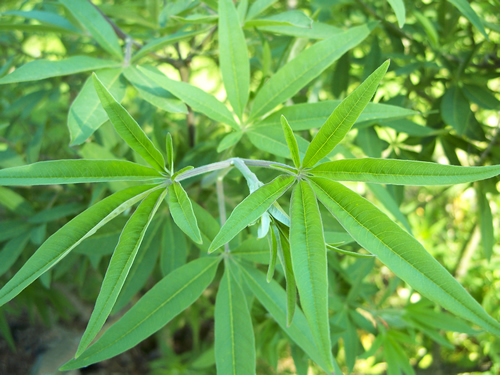Description
Botanical: Vitex agnus castus
Other common names: Vitex, Chaste Tree, Monk's Pepper, Hemp Tree, Indian Spice, Sage Tree, Agnus Castus, Cloister Pepper
Chasteberry is an old and trusted "woman's herb " that is great for easing the discomforts of menstruation and premenstrual syndrome (PMS), including water retention, mood swings, pain and nervous tension. Long used to regulate female hormone levels, menopausal women rely on it as well for alleviating their hormone-related discomforts, and it is also used to increase fertility.
Country or Origin: Morocco.
Beneficial Uses:
Chasteberry has been used for centuries to control and regulate the female reproductive system. The herb appears to show the presence of compounds that are able to adjust the production of female hormones. It normalizes hormone levels and helps to regulate menstrual cycles, helping to regulate monthly periods and treating amenorrhea (absence of menstruation), dysmenorrhea (painful menstruation) and endometriosis.
Chasteberry is believed to promote fertility in women by stimulating growth of the uterine lining, which increases the chances that a fertilized egg will attach to the uterus. Because of its ability to normalize hormone function, Chasteberry has been used to aid the body in regaining a natural balance after the prolonged use of birth control pills.
In the treatment of menopausal discomforts, the hormone-regulating properties of Chasteberry have been very helpful in easing mood swings, hot flashes, etc., as well as treating the many physical problems associated with hormone deficiency. Natural plant compounds help to stimulate estrogen and progesterone production, while inhibiting the production of excessive amounts of testosterone by providing compounds that are very similar to it. Moreover, there have been some preliminary reports from the American Academy of Family Physicians in New Brunswick, New Jersey, that Chasteberry's therapeutic effects in low doses may result in decreased estrogen levels and increased progesterone levels.
Chasteberry also helps to relieve the discomforts of premenstrual syndrome (PMS), including water retention, anxiety, nervous tension, insomnia and mood changes. A double-blind, placebo-controlled study of 178 women found that treatment with Chasteberry over three menstrual cycles significantly reduced PMS symptoms. Women in the treatment group experienced significant improvements in symptoms, including irritability, depression, headache, menstrual pain and breast discomfort. The German Commission E approves the use of Chasteberry for irregularities of the menstrual cycle, cyclical breast tenderness and PMS.
Men with prostate cancer may find hope, because of laboratory studies indicating the use of Chasteberry. Early lab research claims that the herb may reduce the production of prolactin, a hormone responsible for converting testosterone to dihydrostestosterone, which in turn stimulates the growth of malignant prostatate cells. Reducing the production of prolactin, theoretically, should slow the growth of malignant cells, but at this time there have been no clinical trials to prove such claims.
For a healthy pituitary gland, Chasteberry is said to contain hormonal constituents that normalize overall gland function in both men and women.
Chasteberry is said to have a calming and soothing effect on the body and has been used to relieve pains in the limbs, muscle cramps, spasms and weakness.
Contraindications:
Pregnant and nursing women should not use Chasteberry, nor should it be given to children. The herb should not be taken in excess amounts. Chasteberry should not be used concurrently with HRT (hormone replacement therapy).
Women with estrogen-sensitive cancers originating in the breast, cervix or uterus should avoid this herb. Chasteberry could conceivably interact with bromocriptine or other drugs intended to affect prolactin levels (it tends to suppress prolactin, which is the hormone needed for breast milk).


